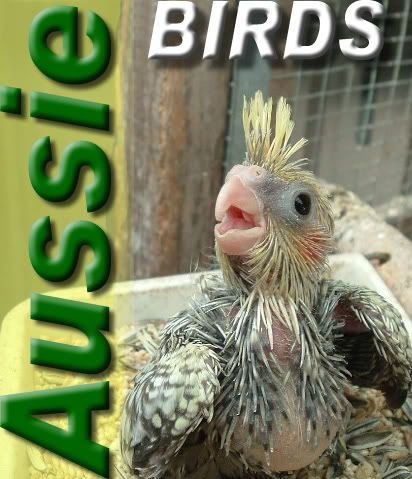Post by AussieBirds on Feb 22, 2005 10:51:32 GMT 10
[glow=red,2,300]This artical is reprinted with the permission of the author[/glow]
Seeds With Vitamins Added vs Sprouted Seeds
by Gudrun Maybaum, Avian Nutrition and Herb Consultant
www.totallyorganics.com E-mail: gudrun@totallyorganics.com
It is becoming more common to find vitamin-fortified seeds for parrots, and I find it hard to understand why manufacturers do that.
I know that some pellet producers use vitamins E and C as preservatives, but I fail to get the seed connection.
We know that our birds need far more than a few vitamins in their diet, and it is my opinion that adding artificial vitamins does harm rather than good. Some of these vitamins are outlawed for human consumption in a number of countries.
For example, users of menadione are required by the manufacturers to wear protective clothing, glasses and masks when handling it. In case of any contact with skin, eyes or inhaling it, workers are advised to immediately consult a physician. Sounds like menadione is not something I want to give my birds to eat.
Even if artificial vitamins have some health-giving properties, they are but a part of the nutrition scale that is needed for the overall health of birds (and humans).
Birds that eat no fresh, raw food cannot get the necessary nutrients from some artificial vitamins.
But there are ways to incorporate nutrition into a seed eater's diet. An easy way is to soak or sprout your own seeds, which is, by the way, a very good method to find out how dead or alive the seeds you feed to your bird are. If they don't sprout, throw them away. Don't even feed them to your bird dry.
Recently I read about different parrot species, like the African Gray, that follow larger animals. They follow elephants and pick in their droppings. Scientists found that the birds eat the germinated seeds they find in these droppings, which have begun sprouting within the elephants' digestive system.
Sprouted seeds have a high nutritional content. On a sprouted-seed diet, my birds eat much less than on a dry-seed diet. They also waste much less.
Seeds are little miracles. Slumbering within them are all the nutrients necessary for a plant to live. Through sprouting, we awaken this dormant treasure. After about 48 hours of sprouting, most seeds are at the peak of their nutritional value. They are loaded with vitamins, minerals, enzymes, chlorophyll, amino acids, fatty acids and more - all of which is offered in a perfect combination only Mother Nature provides. In this form, they are also easy for the body to utilize.
Soaking and/or sprouting a variety of seeds and legumes give birds nutrition that pellets, dry seeds and supplements just cannot provide. Processing always involves some kind of heating or cooking, and heat not only destroys most vitamins, enzymes and fatty acids but changes minerals in such a way that they are difficult for the bird's body to utilize.
Another advantage to sprouting is that it is easy to add dried green foods to the soaked or sprouted seeds, because it will stick on them and be eaten by the bird.
I know people who are afraid of sprouting because of mold and bacteria. I add apple cider vinegar or citrus seed extract to my soaking water to prevent bacteria and mold. And I often feed the seeds after a night of just soaking to my birds. Some of my birds like them better when they are just soaked, some when they are sprouted.
So instead of cooking grains and legumes for my birds, which kills a lot of nutrients, I recommend sprouting them to provide one of the freshest and healthiest foods life has to offer. It also take much less times than cooking, anyway!
John
Seeds With Vitamins Added vs Sprouted Seeds
by Gudrun Maybaum, Avian Nutrition and Herb Consultant
www.totallyorganics.com E-mail: gudrun@totallyorganics.com
It is becoming more common to find vitamin-fortified seeds for parrots, and I find it hard to understand why manufacturers do that.
I know that some pellet producers use vitamins E and C as preservatives, but I fail to get the seed connection.
We know that our birds need far more than a few vitamins in their diet, and it is my opinion that adding artificial vitamins does harm rather than good. Some of these vitamins are outlawed for human consumption in a number of countries.
For example, users of menadione are required by the manufacturers to wear protective clothing, glasses and masks when handling it. In case of any contact with skin, eyes or inhaling it, workers are advised to immediately consult a physician. Sounds like menadione is not something I want to give my birds to eat.
Even if artificial vitamins have some health-giving properties, they are but a part of the nutrition scale that is needed for the overall health of birds (and humans).
Birds that eat no fresh, raw food cannot get the necessary nutrients from some artificial vitamins.
But there are ways to incorporate nutrition into a seed eater's diet. An easy way is to soak or sprout your own seeds, which is, by the way, a very good method to find out how dead or alive the seeds you feed to your bird are. If they don't sprout, throw them away. Don't even feed them to your bird dry.
Recently I read about different parrot species, like the African Gray, that follow larger animals. They follow elephants and pick in their droppings. Scientists found that the birds eat the germinated seeds they find in these droppings, which have begun sprouting within the elephants' digestive system.
Sprouted seeds have a high nutritional content. On a sprouted-seed diet, my birds eat much less than on a dry-seed diet. They also waste much less.
Seeds are little miracles. Slumbering within them are all the nutrients necessary for a plant to live. Through sprouting, we awaken this dormant treasure. After about 48 hours of sprouting, most seeds are at the peak of their nutritional value. They are loaded with vitamins, minerals, enzymes, chlorophyll, amino acids, fatty acids and more - all of which is offered in a perfect combination only Mother Nature provides. In this form, they are also easy for the body to utilize.
Soaking and/or sprouting a variety of seeds and legumes give birds nutrition that pellets, dry seeds and supplements just cannot provide. Processing always involves some kind of heating or cooking, and heat not only destroys most vitamins, enzymes and fatty acids but changes minerals in such a way that they are difficult for the bird's body to utilize.
Another advantage to sprouting is that it is easy to add dried green foods to the soaked or sprouted seeds, because it will stick on them and be eaten by the bird.
I know people who are afraid of sprouting because of mold and bacteria. I add apple cider vinegar or citrus seed extract to my soaking water to prevent bacteria and mold. And I often feed the seeds after a night of just soaking to my birds. Some of my birds like them better when they are just soaked, some when they are sprouted.
So instead of cooking grains and legumes for my birds, which kills a lot of nutrients, I recommend sprouting them to provide one of the freshest and healthiest foods life has to offer. It also take much less times than cooking, anyway!
John


 note that a sprinkle of mutivitamin such as soluvet or similar over the sprouts is an added bonus! cheers ;D
note that a sprinkle of mutivitamin such as soluvet or similar over the sprouts is an added bonus! cheers ;D
